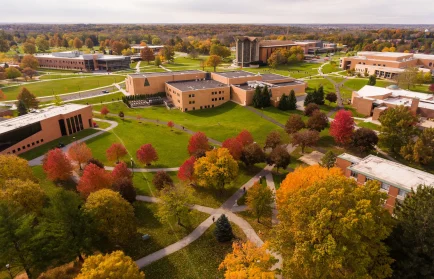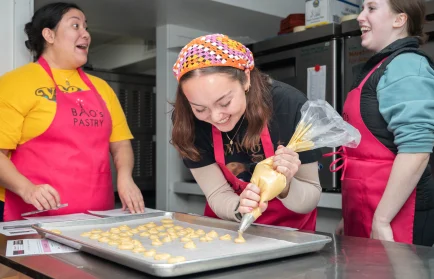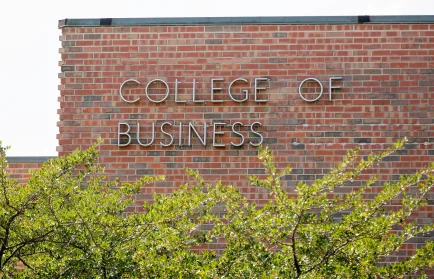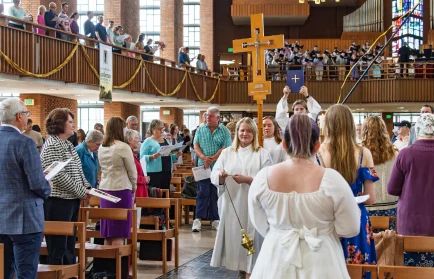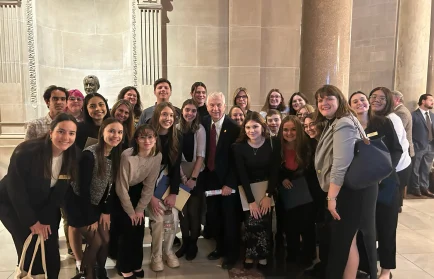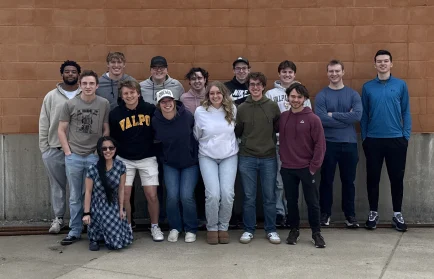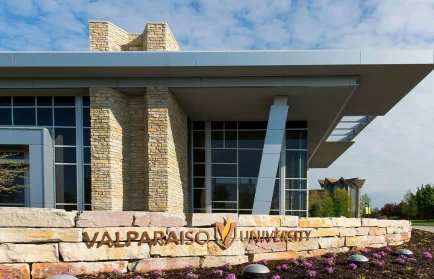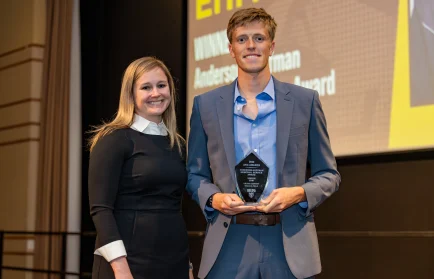Faculty Grants and Awards
Faculty Grants and Awards
In order to encourage creative work and research on the part of its faculty members, Valparaiso University offers opportunity for appropriate recognition and financial assistance for such work through award programs administered by the Creative Work and Research Committee. These programs, for undergraduate faculty and students, include the following:
Awards Available to Undergraduate Faculty
The University Research Professorship program is designed to recognize and encourage scholarly accomplishments and creative work, and to award financial assistance to those faculty members who have demonstrated ability to conduct original research or produce creative work commensurate with their rank and years of teaching, and who are engaged in worthy projects. The appointment to a University Research Professorship is made by the president of the University upon recommendation of the Committee on Creative Work and Research. The Committee selects on the basis of the merit of the proposal (its originality and significance) and the applicant’s capacity to execute the program of study. Use of outside funds to execute a research project shall not preclude appointment to a University Research Professorship. If the candidate to be appointed to the position of University Research Professor is engaged in the fine arts, the title “University Research Professor” shall be replaced by the title “Artist (Poet, Composer, Writer) in Residence.”
A maximum of two (2) University Research Professorships may be awarded each year, and if none of the applications seems suitable, no awards may be given. Professorships provide one semester of full-time leave with pay or two semesters in the same academic year with half-time load, plus a stipend of $2,000 (for AY2024-2025 applicants only payable in FY2025-2026). The stipend will not be subject to retirement benefits. Colleges to which the faculty recipient belongs will receive $15,000 from the Office of the Provost in compensation for the leave, but the expenditure of the funds is controlled by the dean of the college.
Generally, all supporting documents must be submitted to the Office of the Provost by the last week in September. Specific dates can be found on the deadlines web page. All faculty with the rank of lecturer or above, who have served the University for at least three (3) academic years prior to the effective date of the appointment, are eligible.
A University Research Professor shall file with the Office of the Provost one (1) copy of a report on the work done during the year of the appointment as University Research Professor; this report is normally due by October 1, following the period for which the award was granted. The report should be significantly comprehensive.
To give the widest possible support to creative work and research, the Committee will normally give preference to a new candidate. A faculty member who has held a University Research Professorship may be considered for another appointment three (3) or more years after the original appointment has terminated.
Research proposals will be eligible for consideration for a We Raise Foundation – O.P. Kretzmann Memorial Fund Grant if they address themselves to questions of the analysis, diagnosis, and/or cure of physical, spiritual, and mental health issues, irrespective of the academic department of the researcher, or if they address themselves to issues that occur at the intersection of poverty, violence, and inequality. We Raise supports research focused on education, workforce development, and criminal justice.
Preference is given to those proposals that, in addition to satisfying the above criteria, hold promise of practical usefulness in the life and ministry of the church, particularly the Lutheran Church, and lead to the creation of sustainable programs that help people thrive. Grants are made by the president of the University upon recommendation of the Committee on Creative Work and Research and, if desired, augmented by a person chosen ad hoc by the president of the We Raise Foundation (formerly Wheat Ridge Ministries). More information about the We Raise Foundation, its mission, and its priorities can be found at weraise.org.
Any discoveries or inventions made in the course of research under a We Raise Foundation – O.P. Kretzmann Memorial Fund Grant is the property, in equal shares, of the researcher, of Valparaiso University, and of the We Raise Foundation. The right to publish results of the research belongs exclusively to the researcher.
All faculty with the rank of lecturer or above, who have served the University for at least three (3) academic years prior to the effective date of the appointment, are eligible.
In awarding grants from this fund, there must be no discrimination based on race, sex, color, or national origin. Religious considerations may be taken into account to the extent of evaluating the potential value of the proposed research for the life and ministry of the church. In the event no eligible requests for grants are received in any given year, that year’s earnings on the fund will be added to the principal of the fund.
The We Raise Foundation – O.P. Kretzmann Memorial Fund Grant carries a maximum award of $10,000. Applications for this grant shall be submitted to the Office of the Provost. Generally, all supporting documents are due by the last week of November. Specific dates can be found on the deadlines web page.
The grant will not be awarded for any project that in any way contributes toward the attainment of a degree. The grant recipient shall file a detailed report of their work by October 1 following the year for which the award was granted. A copy shall also be filed with We Raise Foundation and the researcher’s department.
The Philip and Miriam Kapfer Faculty Research Award (referred to hereinafter as the Kapfer Research Award) is designed to provide leave and a monetary award for the development and pursuit of research interests among faculty members with preference given to those faculty members in the College of Arts and Sciences. Recipients of the Kapfer Research Award are selected by the Committee on Creative Work and Research under the auspices of the Office of the Provost. Selection is based on the originality and significance of the proposal and the applicant’s perceived capacity to complete the work.
The Kapfer Research Award is funded from an endowment established by the Kapfer family. The award will be presented biennially. The award provides one semester of full-time leave with pay or two semesters in the same academic year with half-time load, plus a stipend of $4,000. The stipend will not be subject to retirement benefits. Colleges to which the faculty recipient belongs will receive $15,000 from the endowment in compensation for the leave, but the expenditure of the funds is controlled by the dean of the college.
The award will be used during the academic year for which it is granted for research in the faculty member’s area of expertise. It may not be used for a project that in any way contributes toward the attainment of a degree. The award recipient will provide the Office of the Provost a comprehensive, written report on the completed research together with plans for additional ways to disseminate the research results by October 1 following the award year.
In the event that no eligible request for the Kapfer Research Award is received in a given year, no award may be granted, and that year’s earnings on the fund will be added to the principal of the fund.
Eligibility:
All faculty, with a preference for those in the College of Arts and Sciences, with the rank of lecturer or above and who have served the University for at least three (3) academic years prior to the effective date of the appointment, are eligible to apply for the Kapfer Research Award. A faculty member who has received a Kapfer Research Award may be considered again for the award only if three or more years have elapsed since the original award year. Applications for the 2026-2027 Kapfer Research Award will be accepted in Fall 2025.
Application Guidelines:
Generally, all supporting documents are to be submitted to the Office of the Provost by the last week of September. Specific dates can be found on the deadlines web page. The application form is the same as that used by applicants for the University Research Professorships. All College of Arts and Sciences faculty who apply for a University Research Professorship in a year that a Kapfer Research Award is made will be considered to have also applied for the Kapfer Research Award.
The Summer Research Fellowship program is designed to give financial assistance to faculty members for conducting creative work and research during the summer months. The maximum award for the Summer Research Fellowship is $3,500. The Fellowship will be viewed as a stipend that will be paid in the form of a grant at the end of the preceding spring semester and will not be subject to retirement benefits. All or part of the money can also be used to cover research expenses such as travel, student aides, expendable supplies, and equipment. Those wishing to use the award to defray expenses must submit a tentative budget which will be subject to University approval. Those seeking Summer Research Fellowships are also eligible to apply for additional money for expenses through expense grants described elsewhere.
Applications for Summer Research Fellowships shall be submitted to the Office of the Provost. The deadline for the receipt of all supporting documents is Sunday, December 15. All faculty with the rank of lecturer or above are eligible.
Summer Research Fellowships shall not be awarded for any project that in any way contributes toward the attainment of a degree. Preference may be given to those who have obtained supplemental funding for this project from outside resources. Faculty with 12-month appointments are eligible for Summer Research Fellowships, but only with the understanding that they will receive appropriate workload credits rather than a cash grant. The applicants must negotiate the availability of workload credit with their chair or dean prior to applying. The stipend, or portions of it, can be made available to the unit to enhance existing budgets or to defray expenses incurred in covering for workload credit. As indicated above, the stipend can also be used to cover research expenses.
A Summer Research Fellow shall file with the Office of the Provost a detailed report on his/her work, normally by October 1, following the summer for which the award was granted. A copy shall also be filed with the Summer Research Fellow’s department or college. If a subsequent application for a Summer Research Fellowship is made on the basis of the same project, a detailed progress report on the work done under the earlier award shall accompany the application.
The Creative Work and Research Expense Grants program is designed to help faculty members meet expenses that occur in connection with creative work and research. All faculty with the rank of lecturer or above are eligible. Visiting faculty are also eligible, as are adjunct faculty who have completed three years of service with the University.
The funds will support ten or more awards per year with a soft cap of $1,000 each. Expenses in connection with projects that lead toward attainment of a degree will not be considered.
The deadline for the receipt of the application and all supporting documents is in early February. Specific dates can be found on the deadlines web page.
The Creative Work and Research Committee (CWRC) invites faculty to apply for a limited number of $500-$1000 awards, which are intended to support an undergraduate student creative or research project. These funds come from a University Guild endowment for student research. CWRC intends for these awards to support a first-time creative/research experience for a first or second year student, with the goal of helping to recruit and retain promising students. For example, a department could offer the award to a prospective student with the hope that the student will choose to matriculate at the university and will carry out the project as part of the first year experience. Students often report that a meaningful academic project done in close contact with a faculty mentor is an important factor in their overall success and satisfaction with their college experience.
CWRC intends for the funds to be used to pay the student for his/her participation, similar to a position as a student aide. Applications requesting a small amount of the overall budget for other purposes (equipment, supplies, travel, etc.) will be considered.
Each grant proposal should follow the format below:
I. Abstract
Please provide an abstract of 200 or fewer words.
II. Project Description
Applicants will briefly describe the project they envision, with enough detail to provide a clear picture of the project but without technical or specialized description which would obscure the description’s clarity.
Applicants should give special attention to the following:
- The purpose of the project: What are the objectives? What theoretical framework, if any, underlies the student’s project? If this is a part of the faculty mentor’s ongoing research, what is the relationship between the proposed project and the larger research project?
- The significance of the research: What is the value of this research? Why does it matter? How will it add to what is known about this subject? To what audiences does this matter and why?
- The plan of work: What is the timetable for the work? What special tasks or processes will be involved? What specific activities will the student carry out? Approximately how many hours will the student work? Who is the faculty mentor(s) and how will they work with and supervise the student? How will the project benefit the student?
- Anticipated results: If all goes as planned, what are the expected outcomes of the student’s project (conference presentation, publication, performance, etc.)? How will you ensure that the information learned from this project does not end with you? In other words, what is the dissemination plan for what you and the student learn?
III. Budget
A brief, but specific, statement of how the grant (up to $1000) will be spent. As mentioned above, it is expected that most of the funds will be used for student wages or stipends, but applications requesting a portion of the overall budget for equipment, materials, travel, etc. will be considered. If you request funds for supplies, equipment, travel, etc., why are they needed to accomplish the project goals?
IV. Curriculum Vitae
Upload the CV of the faculty mentor(s) who will supervise the student’s work.
V. (Optional) Letter of Support
The applicant has the option to include a letter of support from the department chair or dean of the appropriate unit.
All applications and supporting documentation must be uploaded as a PDF file using the appropriate online submission form.
The awardee will be engaged in the national or international conversation within his/her domain of study, demonstrating notable accomplishments and recognition in scholarly, artistic, or other relevant communities. Evidence for this will consist of a body of public work in the form of refereed publications, public performance, juried presentations, invited presentations, and/or public service on regional, state, or national committees/commissions or other works/services appropriate to the discipline.
The award will be presented annually and includes a $3,000 stipend. This applies to the current 2024-2025 academic year.
All full-time employees with faculty status and at least seven years of full-time equivalent employment are eligible. Prior winners of the award are eligible after 10 additional years of service and must document significant scholarly achievements during this interval. Nominees may be re-submitted by the colleges for a second year without editing nomination packages. After two years, nominees may still be re-submitted, but should provide an updated nomination package at that time. Senior research professors are not eligible.
